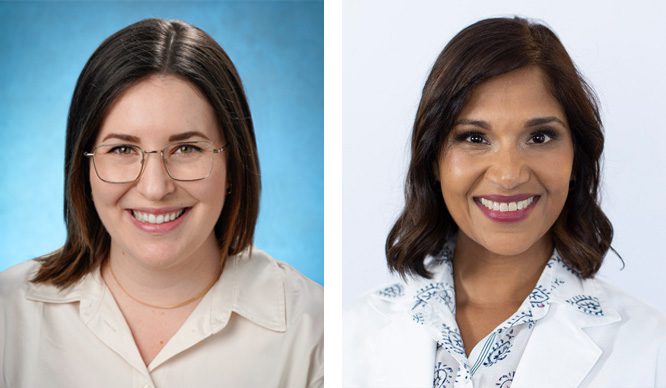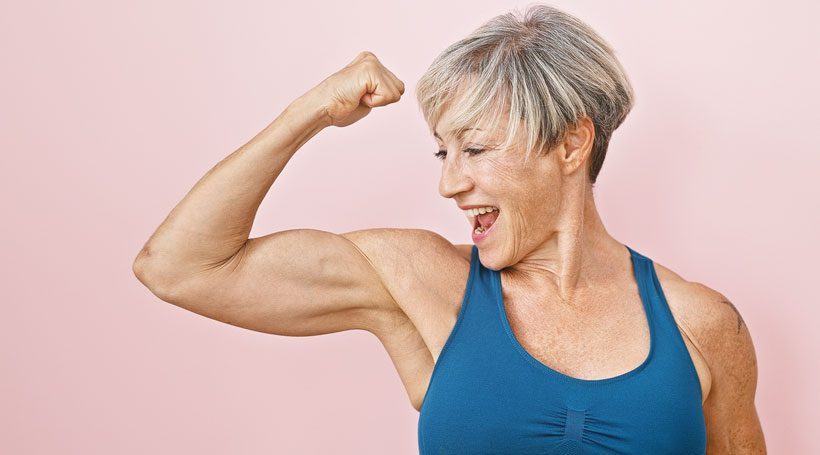If staying healthy were as simple as following the latest trends, anyone with TikTok would be in great shape. But with so much conflicting advice on nutrition, exercise and hydration everywhere you look, it’s hard to know what’s real and what’s just hype.
“It’s great that we have access to so much health information, but a lot of it is designed to sell a product rather than actually help people,” says Jenna Weidman, MD, a family medicine physician at Inspira Medical Group. Marketing plays a huge role in how health trends spread, often making things seem healthier than they really are. “Just because something is labeled ‘plant-based’ or ‘low-fat’ doesn’t mean it’s actually good for you. And when people see these buzzwords over and over, they start believing the claims without looking at the details.”
Here’s a look at some of the most common health myths – and what’s really true.

Jenna Weidman, MD and Nidhi Agrawal, MD

TikTok: Women don’t need to lift heavy weights
Reality: Lifting weights helps women build muscle mass, which they lose as they age
Strength training is one of the most important things women can do for their long-term health.
“We naturally lose muscle mass as we age, and for women, bone loss accelerates after menopause,” says Nidhi Agrawal, MD, a primary care and sports medicine physician at Jefferson Health. “Strength training helps maintain both muscle and bone health, which is key to staying strong and preventing injuries.”
Without strength training, women may experience weaker bones, decreased mobility and a higher risk of fractures later in life. “The biggest concern is osteoporosis,” Agrawal explains. “When women don’t build and maintain muscle, they lose bone strength, making them more vulnerable to falls and fractures.”
Agrawal recommends strength training at least two to three times per week, with each session lasting 25 to 30 minutes. “That’s enough to maintain strength and slow down the natural loss of muscle and bone mass,” she says. And that can include resistance bands and bodyweight exercises. “Anything that forces your muscles to work against resistance counts.”
For women worried about bulking up, Agrawal says that won’t happen. “Women don’t have the testosterone levels to build bulky muscles like men,” she explains. “What strength training actually does is make you leaner, stronger and more resilient as you age.”

TikTok: A plant-based diet is always the healthiest choice
Reality: It’s not that simple
“French fries are plant-based. So are ultra-processed meat substitutes,” Weidman says. “Just because something has that label doesn’t mean it’s healthy.”
The key is opting for whole food plant-based eating – vegetables, legumes, whole grains and nuts – while avoiding processed foods. “A whole food, plant-based diet has real health benefits, like reducing the risk of heart disease, diabetes and obesity,” Weidman says. “But it’s not always easy to stick with, especially if you’re used to a more traditional American diet.”
A strict plant-based diet also requires careful planning to get enough protein and key nutrients, such as vitamin B12, iron and omega-3s, which are primarily found in animal products.
“You don’t have to go all-or-nothing,” Weidman says. “Even small shifts – like eating more plants and cutting back on processed foods – can have a big impact.”

TikTok: Alcohol in moderation is harmless
Reality: Even one drink has an effect
“The truth is, alcohol doesn’t do your body any favors,” Agrawal says. “It stresses your liver, disrupts sleep and adds empty calories that can lead to weight gain.”
And it’s not just the alcohol itself that can be a problem – it’s what comes with it. “People don’t drink and then reach for a salad,” Agrawal adds. “They’re eating nachos, fries or pizza. That’s where the real damage adds up.”
She also notes that cutting back – even without quitting completely – can have noticeable benefits, from better sleep to easier weight management.
TikTok: Hydration requires more than just water
Reality: Plain water is (almost always) enough
With electrolyte drinks, hydration powders and vitamin-enhanced waters flooding the market, plain old water almost seems outdated. But do we really need all those extras?
“For most people, plain water is all you need,” Agrawal says. “Your body is incredibly efficient at regulating hydration and electrolytes on its own, as long as you’re eating a balanced diet.”
The kidneys maintain hydration by adjusting fluid and electrolyte levels based on what you consume. “If you’re eating a variety of whole foods, including fruits, vegetables and whole grains, you’re naturally replenishing important electrolytes like sodium, potassium and magnesium,” she explains.
Electrolyte drinks are useful only in extreme conditions. “If you’ve been running a marathon or exercising intensely for hours, then yes, electrolyte replacement can be helpful,” Agrawal says. “But for most people, just drinking water and eating a balanced meal afterward is enough.”
For those who find plain water boring, she suggests natural flavor boosters. “Try adding lemon, cucumber or berries,” she says. “They make water more appealing without unnecessary additives.”

TikTok: Supplements are essential for good health
Reality: Most people don’t need them
“Unless you have a specific deficiency, most supplements aren’t necessary,” Weidman says. “A well-balanced diet provides nearly all the nutrients your body needs.”
That’s not to say they’re necessarily harmful – just that they may not be doing as much as people think. “A lot of people like taking them because it makes them feel like they’re being proactive about their health,” she says.
Some people do benefit from supplements. Pregnant women need folic acid to support fetal development, postmenopausal women may require extra vitamin D for bone health, and strict vegans often need vitamin B12, which is primarily found in animal products, she says. But for the average healthy adult, extra vitamins don’t necessarily translate into extra health benefits.
She also warns that more isn’t always better. “Fat-soluble vitamins like A, D, E and K can build up in your system if you take too much, potentially leading to toxicity,” she says.
A smarter strategy? Focus on eating a variety of nutrient-dense foods, and if you’re concerned about a deficiency, consult a doctor before adding supplements to your routine. “Food should always come first,” Weidman says.















